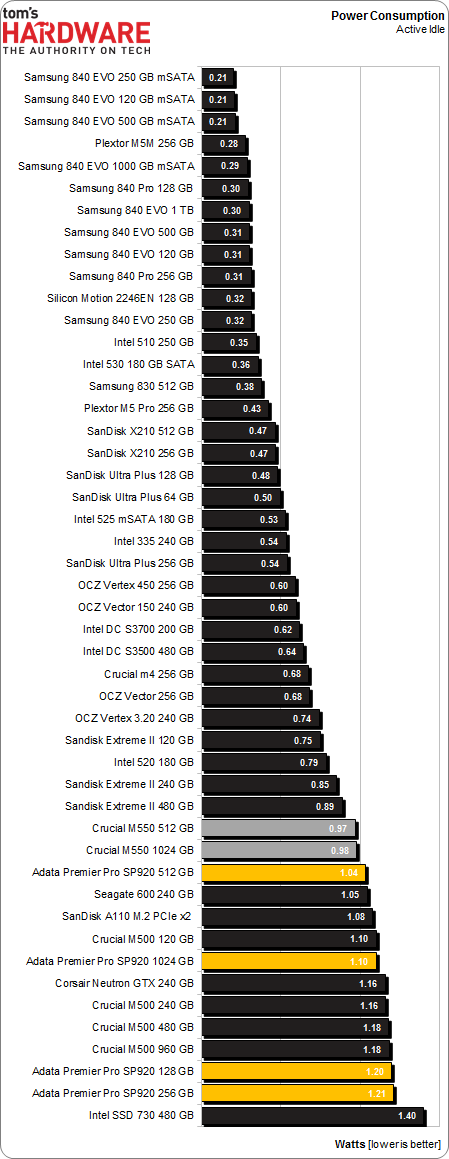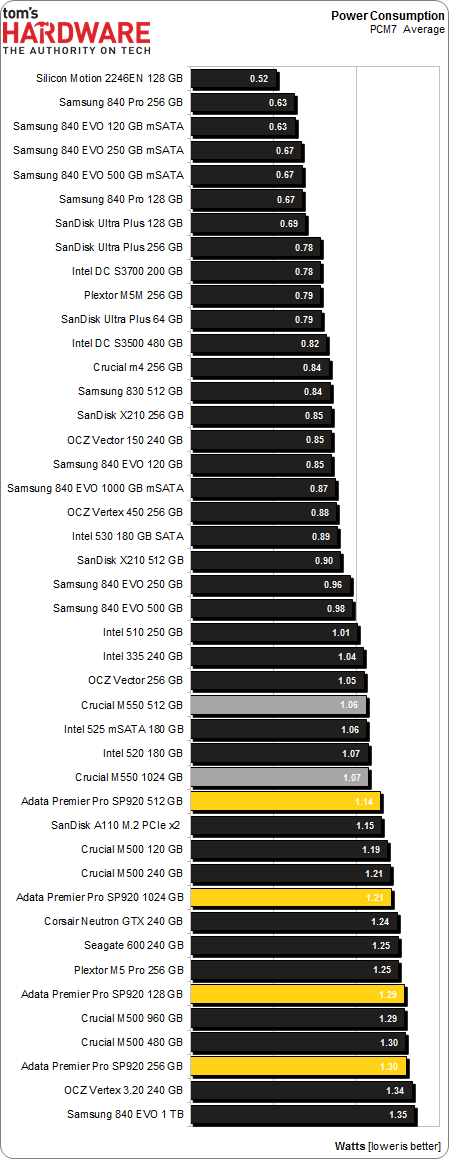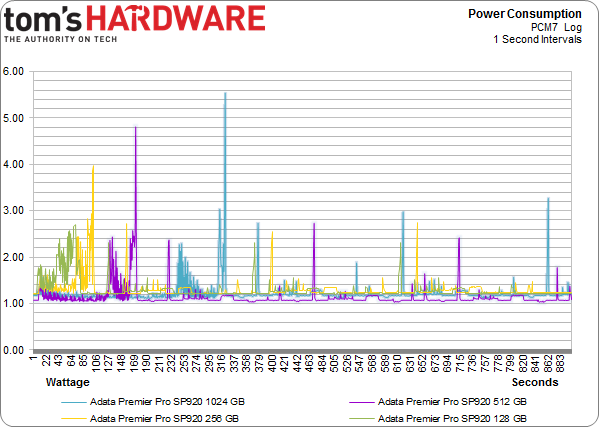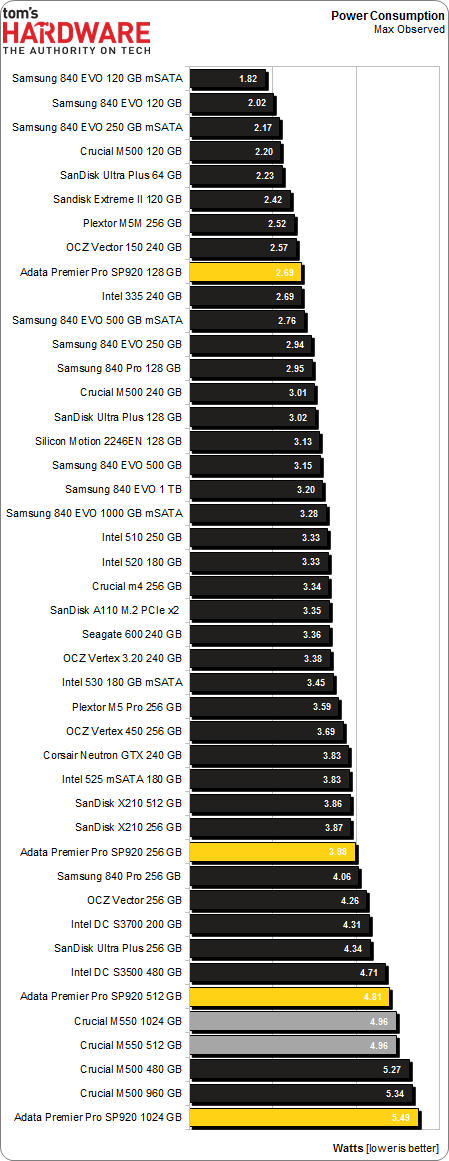Adata Premier Pro SP920 SSD: From 128 To 1024 GB, Reviewed
Adata shifts away from SandForce in its Premier Pro SP920 SSD family. With promises of incredible performance and spiffy features like DevSlp, Adata's latest employs the Marvell controller we saw in Crucial's M550. But the two share quite a bit more...
Results: Power Consumption
Active Idle Power Consumption
Idle consumption is the most important power metric for consumer and client SSDs. After all, solid-state drives complete host commands quickly and then drop back down to idle. Aside from the occasional background garbage collection, a modern SSD spends most of its life doing very little. Enterprise-oriented drives are more frequently used at full tilt, making their idle power numbers less relevant. But this just isn't the case on the desktop, where the demands of client and consumer computing leave most SSDs sitting on their hands for long stretches of time.
Active idle power numbers are critical, especially when it comes to their impact on mobile platforms. Idle means different things on different systems, though. Pretty much every drive we're testing is capable of one or more low-power states, up to and including DevSlp. That last feature is a part of the SATA 3.2 host specification. And while it requires a capable SSD and a compatible platform, enabling DevSlp takes power consumption down to a very small number.
As with performance, active idle is another discipline we'd expect Adata and Crucial to measure identically in. But the M550s manage to slip in under the SP920s. Again, it's a small, yet quantifiable difference.
There is one possible explanation. Take a gander at the 1 TB drives, highlighted above. Shouldn't the 1024 GB M550 and SP920 demonstrate the exact same behavior? We know active idle is largely a function of the controller itself, since the amount of NAND on-board doesn't move the dial much. As an example, when we spent time with Intel's SSD 730, its overclocked processor affected our active idle measurement substantially.
And we see the same thing here. Compare Adata's SP920 to the M550s and we see the Crucial drives demonstrating lower power use. Could the controller be to blame? We know these are identical ASICs on the surface, but I think it's possible that Micron is reserving higher-binned 9189s for its own purposes, hitting comparable clock rates using less voltage. We reached out to Marvell for comment on this and received no answer.
PCMark 7 Average Power Consumption
Get Tom's Hardware's best news and in-depth reviews, straight to your inbox.
If we log power consumption through a workload, even a relatively heavy one, we see that average use is still pretty close to the idle numbers. Maximum power may spike fiercely, but the draw during a PCMark 7 run is light. You can see the drives fall back down to the idle "floor" between peaks of varying intensity.
The story reported previously repeats itself here. Physically, the Adata and Crucial drives appear identical. But there are subtle differences between them not apparent based on looks alone.
Charting power over time makes it easy to see the SP920s dropping back to the 1 W+ idle floor. Peak consumption is commensurate with drive capacity.
Maximum Observed Power Consumption
Maximum power use ends up close to where we'd expect it.
Current page: Results: Power Consumption
Prev Page Results: TRIM Testing With ULINK's DriveMaster 2012 Next Page Adata SP920: Adding Value With A Nice Bundle-
cryan Reply13011395 said:I prefer Sandisk, if you don't mind.
The X210 is pretty awesome, but newer Marvell implementations are built with Haswell-style power features in mind. If you're looking for a drive to use in mobile applications, mind the heat and power consumption stats.
Regards,
Christopher Ryan -
rajangel Awhile back I purchased a few different SSD's to test out (OCZ, Crucial, Patriot, Adata). The Adata is the only one still running and was always the quickest. I don't know how this one is built, but the last Adata was built tough. The OCZ was so flimsy it felt like paper. The Crucial and the Patriot were slightly better in build quality. Now that I'm in the market for a new drive I may consider this.Reply -
cryan Reply13012280 said:Awhile back I purchased a few different SSD's to test out (OCZ, Crucial, Patriot, Adata). The Adata is the only one still running and was always the quickest. I don't know how this one is built, but the last Adata was built tough. The OCZ was so flimsy it felt like paper. The Crucial and the Patriot were slightly better in build quality. Now that I'm in the market for a new drive I may consider this.
I have to say, the plastic or metal chassis a drive comes in doesn't mean much. In the lab, I like a nice heavy metal SSD casing, but in a laptop? You probably want a flimsy plastic chassis. It's not conductive and doesn't add much weight.
Regards,
Christopher Ryan -
rajangel It's a matter of opinion. I like things that are built well, and have a quality appearance. I think build quality does affect performance (read reliability). Especially when connectors/etc are cheap in construction. However, just my opinion.Reply -
cryan Reply13012326 said:It's a matter of opinion. I like things that are built well, and have a quality appearance. I think build quality does affect performance (read reliability). Especially when connectors/etc are cheap in construction. However, just my opinion.
I agree that a substantial chassis tends to reinforce the perception of a drive's build quality, but much of the time its aesthetic. The component choice on the PCB speaks more to quality. I've seen some downright terrible drives in the fanciest of cases.
Regards,
Christopher Ryan
-
rajangel I think there should be a restriction that prevents the article author from replying, unless there is a substantial mistake that was noted. I feel like tomshardware authors troll their own threads. This has become a problem lately. I'm at the point where I feel my business and time would be better spent on a real tech website. Tomshardware is like the Yahoo of tech sites lately.Reply -
iltamies Typo on last page: "Adata gets a solid product able to soften the wait, and Micron (Crucial's parent company) gets to more more volume." should read "move more volume."Reply -
Wisecracker Impressive ... power consumption is a bit high though, compared to the Samsung 120GB Evo (my current $80 fav)Reply
Are 'microseconds' considered 'milliseconds' ??



